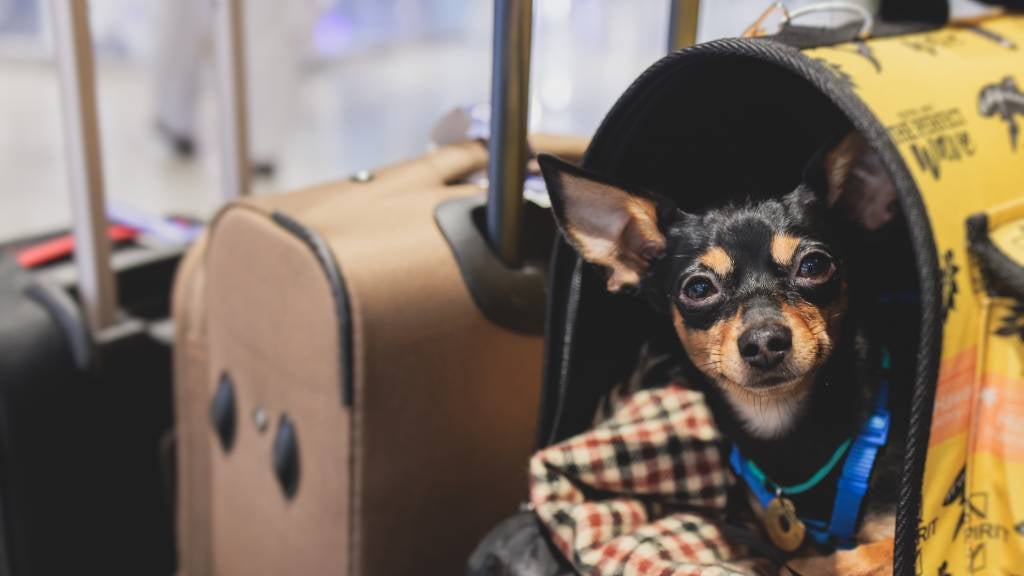Choose pet-friendly holiday accommodation for the whole family

Each year, thousands of Kiwi pet owners pack their bags and hit the road, bringing their companions along for a holiday adventure. After all, why should our pets miss out on the fun?
Yet, as anyone who has tried to book pet-friendly accommodation can attest, not every place that claims to welcome pets is truly designed with them in mind.
In this piece led by Dr Rosalind Holland (BVSc, MVM, MANZCVS), we’ll explore what makes accommodations genuinely pet-friendly and how you can choose the best one for your whole whānau — including the four-legged members.
What is pet-friendly accommodation?
Pet-friendly accommodations are lodgings that welcome animals, offering features designed to accommodate pets' needs alongside their human counterparts.
Pet-friendly holiday retreats can come in all shapes and sizes, from hotels or Airbnb homes to campsites and cabins. The key feature is a pet-friendly policy that welcomes pets (with maybe a few restrictions).
Many booking sites now allow you to filter searches by pet-friendly options, making it easier than ever to find a place that suits you and your pet. Some websites like Dogalong NZ and Bring Fido even list pet-friendly amenities beyond lodging, such as local dog-friendly restaurants and parks.
What makes a place pet-friendly?
The essence of a pet-friendly accommodation lies in its policies and amenities.
"The most important feature of pet-friendly accommodation is a pet-friendly policy, although some places will have restrictions on pet species, size, or behaviour," Dr Holland says.
A clear policy from the accommodation means there is understanding about bringing your pet; you know they are welcome and what's expected of them during your stay. It also means you don't need to waste time calling ahead everywhere you go to check if they will accept your pet.
Accommodations that are genuinely pet-friendly will have more than just a written policy; they will have amenities to make your pet's stay as comfortable and enjoyable as yours. Common features of pet-friendly accommodation:
- fenced-in yards or dog runs
- designated potty areas
- waste disposal stations
- nearby dog-friendly attractions or activities
The goal is to find a place that welcomes your pet as warmly as it welcomes you.
How to choose the perfect pet-friendly accommodation
Finding the right lodging involves more than just hitting the 'pet-friendly' filter on your accommodation search. Think about the activities you plan to enjoy during your stay in the area and whether they'll be doable with your pet.
This is particularly important if you are interested in exploring the abundance of amazing eco-tourism Aotearoa offers. Many of these areas, such as conservation land, have strict restrictions on pets, and some places, such as wildlife sanctuaries and National Parks, do not allow pets at all.
You want to avoid any scenarios in which your pet is left alone in your car, especially during warm temperatures. It’s also important to not leave your pets alone in the accommodation since these are highly unfamiliar areas and can cause pets unnecessary stress.
When it comes to dining, many cafes and restaurants offer pet-friendly outdoor seating and water bowls. If a venue's pet policy isn't clear online, a quick phone call can save you from any awkwardness upon arrival.
Matching your pet's needs with accommodation amenities
Your pet has unique needs, and your accommodation should meet them. Check for breed or size restrictions and be aware of any extra fees for pets. Read reviews from other pet owners to gauge how welcoming a place truly is.
Dr Holland advises thinking about your pet’s specific needs. For example, active dogs will appreciate access to outdoor spaces, anxious pets or cats often prefer quieter, low-traffic environments, and older animals may need ground-floor accommodations for easy accessibility.
Tips for dogs
New Zealand has no shortage of beautiful places to explore with your dog. Here are our best tips to make your holiday a breeze while respecting the locals, the environment, and your accommodation.
- Research local laws: Make sure you're aware of off-leash areas and leash regulations in the area you'll be visiting.
- Keep conservation in mind: Many conservation areas have restrictions on dogs, especially areas protecting native wildlife. Additionally, practise good biosecurity habits like cleaning outdoor gear and your dog's paws between outdoor activities, to prevent the spread of pests and diseases such as kauri dieback or freshwater weeds.
- Bring a piece of home: Familiar items like your dog's bed, crate, toys and food bowl can help them feel more comfortable in a new environment.
- Be considerate of others: Not everyone is comfortable around animals, so be mindful of others when walking your dog or bringing them into your accommodation. Always clean up after them to leave a good impression and maintain a positive image for future pet travellers.
Tips for cats
Cats tend to be more challenging travel companions; they often prefer familiar surroundings and routines. Also, many accommodations cater more to dogs than cats, so it's essential to do your research thoroughly.
- Keep it quiet and chill: Quiet accommodations are generally more suitable for cats who may become stressed by loud noises or unfamiliar environments. Look for pet-friendly hotels and rentals that specifically cater to cats.
- Bring familiar scents: Like dogs, cats may feel more at ease with items that smell like home, such as their bed, blanket or favourite toy.
- Safe and secure: Losing your cat in an unfamiliar environment can be stressful and dangerous. Ensure that they are secure and cannot escape from your accommodation or vehicle. Test that windows and balconies are secure and provide a hiding space, like a carrier or enclosed bed, that they can retreat to. Ensure your cat is microchipped and all details are correct as part of the Companion Animals NZ Register.
- Cat-proofing: Your accommodation may not have accounted for the antics of cats so when you arrive, do a quick cat-proofing. Put houseplants out of reach and stow away anything they may knock off surfaces, such as vases and books.
Wrapping up
Travelling with pets requires a bit of preparation, but it’s well worth the effort. Taking your pet to the vet for a health check-up before you go is good practice. Ensure all vaccinations and treatments are up-to-date.
Keep your vet’s number handy, along with the contact information for a local vet in your destination area. And don't forget to bring your pet insurance details, just in case you need veterinary assistance on your travels. If you don’t have pet insurance, consider if SPCA Pet Insurance could be suitable for you and your pet. With three levels of cover to choose from, you can help protect your pet and allow them to live their best life, whether on holidays or at home!
Choosing the right pet-friendly accommodation can enhance your holiday experience, ensuring everyone, including your pets, has a fantastic time. By focusing on what makes a place truly welcoming for animals and matching these features with your pet's needs, you'll create a memorable and stress-free vacation.
4 Dec 2024
